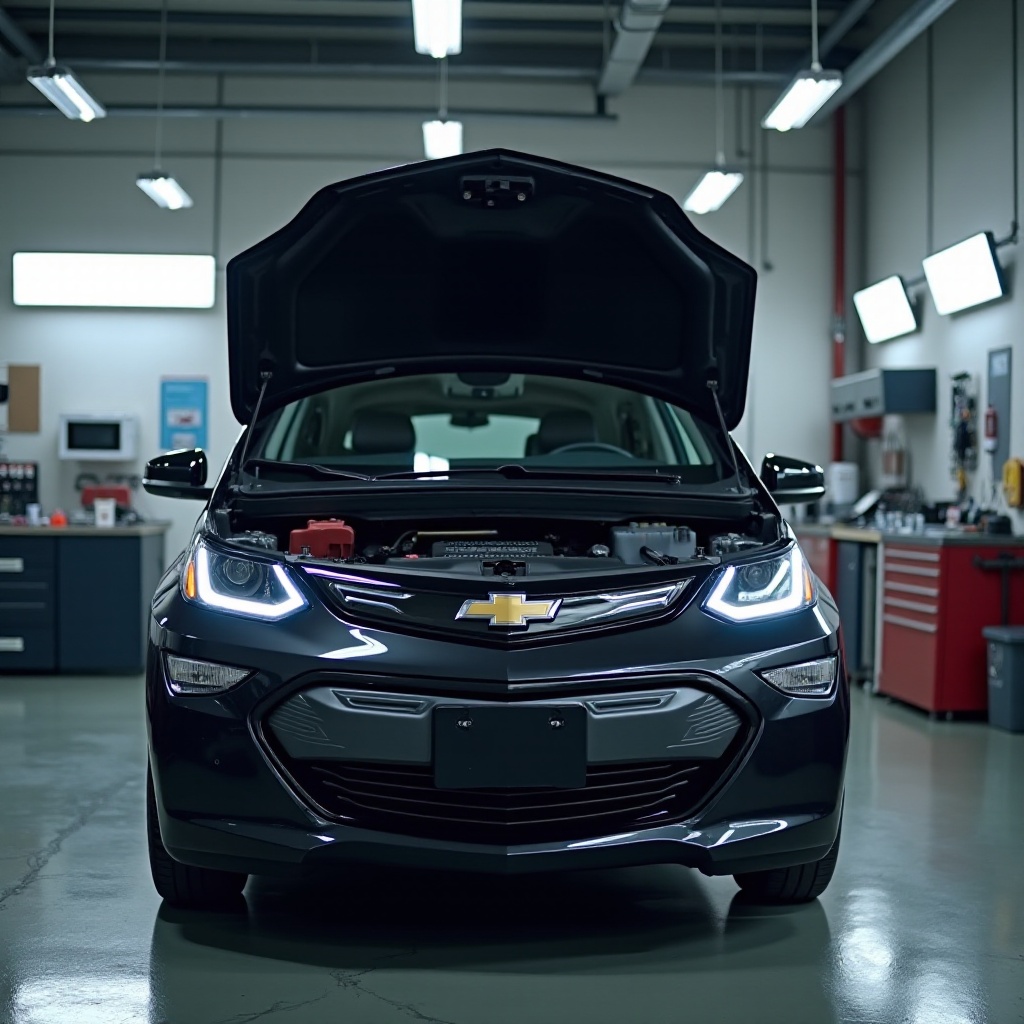Introduction
Chevy Bolt owners understand the importance of maintaining their electric vehicle’s battery. As a crucial component, the battery ensures not only smooth performance but also the safety of your ride. This guide provides a detailed step-by-step process for Chevy Bolt battery replacement, highlighting costs, signs, and environmental factors. Whether you’re experiencing issues with your battery or planning ahead, this comprehensive guide has you covered.

Understanding Your Chevy Bolt Battery
Key Components and Specifications
The Chevy Bolt’s battery is a sophisticated piece of technology, comprising lithium-ion cells known for their high energy density. Typically, the Bolt utilizes a 60 kWh battery pack, designed to provide an estimated range of 238 miles on a full charge. Understanding these specs helps you appreciate the power and efficiency encapsulated within your vehicle.
Average Lifespan and Performance Metrics
On average, a Chevy Bolt battery is expected to last around 8-10 years or 100,000 to 150,000 miles, depending on which milestone you hit first. Performance metrics include charging cycles and energy retention capacity over time. Consistent performance monitoring ensures your battery maintains optimal functionality.
Signs You Need a Battery Replacement
Warning Indicators and Symptoms
Several indicators suggest that your Chevy Bolt might need a battery replacement. Key signs include reduced driving range, warning lights illuminating on the dashboard, and increased charging times. If you notice these symptoms, it’s crucial to assess the battery’s health promptly.
Importance of Timely Replacement
Timely battery replacement is crucial. Delaying replacement can lead to more severe issues, including total battery failure and compromised vehicle performance. Proactively monitoring and addressing battery health can prolong your vehicle’s lifespan and ensure safety.

Step-by-Step Battery Replacement Process
Necessary Tools and Preparations
Before beginning the replacement process, gather the necessary tools including wrenches, screwdrivers, and safety gear. Ensure the vehicle is in a secure, well-ventilated location, and disconnect the power supply to prevent accidents.
Detailed Replacement Instructions
- Disconnect the Battery: Start by turning off your vehicle, then remove the battery’s negative terminal followed by the positive terminal.
- Remove Protective Covers: Next, carefully remove the protective covering to expose the battery.
- Unbolt and Remove the Old Battery: Use appropriate tools to unbolt the battery. Carefully lift it out, ensuring no cables are damaged.
- Install the New Battery: Place the new battery in the compartment and secure it firmly. Reconnect the positive terminal followed by the negative terminal.
- Test the Installation: Finally, start your vehicle and ensure everything is functioning correctly.
Safety Precautions
Always wear safety glasses and gloves to protect against acid exposure and electrical shocks. Avoid smoking or exposing the battery to open flames. If unsure about any step, consult a professional to prevent accidents.
Exploring Costs and Warranty Options
Breakdown of Costs Involved
The cost of a Chevy Bolt battery replacement can vary, typically ranging from $5,000 to $8,000, including labor. Factors influencing the cost include the battery’s condition, labor charges, and whether you choose an OEM or aftermarket battery.
Chevy’s Battery Replacement Warranty
Chevrolet offers an 8-year/100,000-mile warranty on the original battery. This warranty covers repairs or replacements due to defects or significant capacity reduction. Understanding these terms can save you substantial out-of-pocket expenses.
Choosing the Best Replacement Battery
OEM vs. Aftermarket Batteries
When choosing a replacement battery, you can opt for an OEM (Original Equipment Manufacturer) or an aftermarket battery. OEM batteries are designed by the manufacturer and ensure compatibility and optimal performance. Aftermarket batteries are generally cheaper but may not match the quality and longevity of OEMs.
Factors to Consider
Certain factors should be considered when selecting a battery. Compatibility, warranty, cost, and performance reviews are essential. Prioritize batteries with higher ratings and robust customer support to ensure long-term reliability.
Environmental Considerations and Recycling
Responsible Disposal Practices
Battery disposal must adhere to environmental regulations. Improper disposal can lead to hazardous waste issues. Utilize designated recycling centers and programs to ensure responsible disposal.
Advances in Battery Recycling Technology
Recent advancements in battery recycling have made significant strides in reducing environmental impact. Innovative techniques now allow for the recovery of essential elements, thereby promoting sustainability and supporting the circular economy.

Conclusion
Understanding your Chevy Bolt battery and knowing when and how to replace it can significantly enhance your vehicle’s performance and longevity. By following this comprehensive guide, you ensure timely and efficient battery replacements, optimal vehicle performance, and adherence to environmental responsibilities.
Frequently Asked Questions
How long does a Chevy Bolt battery typically last?
A Chevy Bolt battery typically lasts around 8-10 years or 100,000 to 150,000 miles under standard usage conditions.
Can I replace my Chevy Bolt battery myself?
Yes, you can replace the battery yourself if you have the necessary tools and follow appropriate safety precautions. However, it’s advisable to consult a professional if you’re inexperienced.
What is the cost of replacing a Chevy Bolt battery?
The cost of replacing a Chevy Bolt battery generally ranges from $5,000 to $8,000, depending on various factors such as the battery’s condition and the labor involved.
